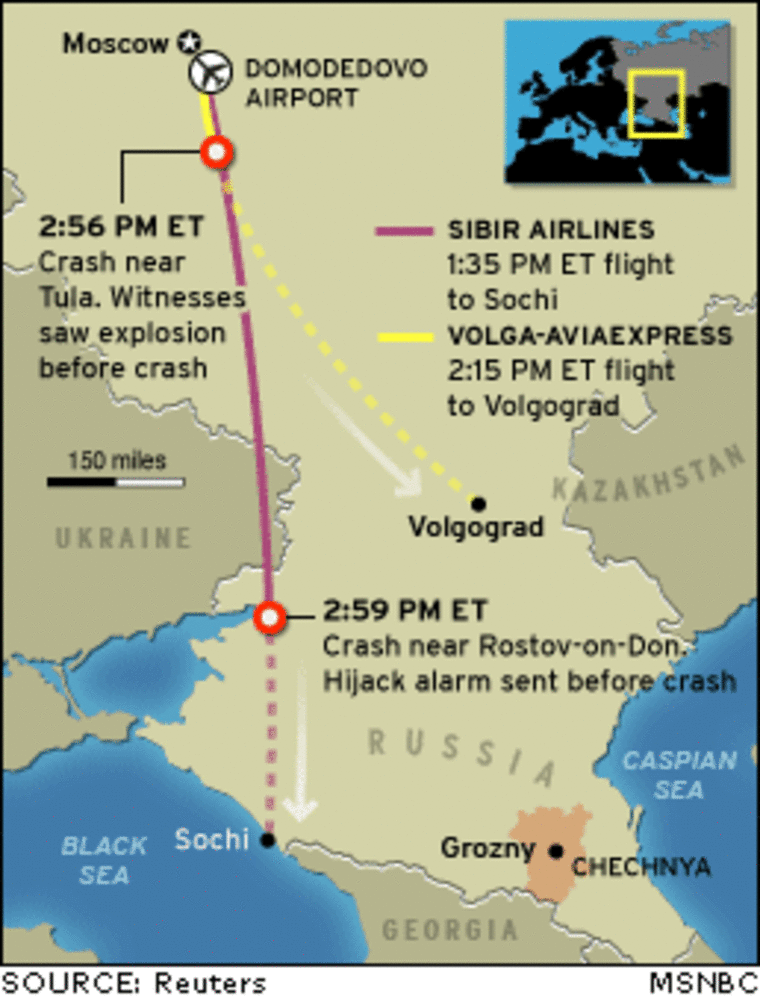Russia’s transport minister, citing a “black box” recording from one of two planes that crashed minutes apart last week, said Monday there was no evidence of a hijacking attempt or any other disturbance before the explosion aboard the jetliner.
The conversation inside the cockpit of the Tu-154 plane indicated the crew was unable to contact traffic controllers and tried to manage the jet for some time after the blast on board. “The words spoken by the crew members among themselves are (about) work by the crew to save the plane,” the minister, Igor Levitin, said.
Also, new details emerged about two Chechen women who are the focus of suspicions that the planes were blown up by terrorists. All 90 people aboard the aircraft were killed.

Gen. Andrei Fetisov, chief of the scientific department at the Federal Security Service, said there was no longer any doubt that “both planes crashed as a result of explosions,” the ITAR-Tass news agency reported Monday. He reiterated that traces of the high explosive hexogen were found in the wreckage.
How the explosive may have been brought on board the planes that took off from Moscow was still unclear, however, and investigators were scraping for clues about Amanta Nagayeva and S. Dzhebirkhanova, two Chechen women whose names were listed on tickets for the flights.
The crashes happened just five days before presidential elections in Chechnya, where separatist rebels have been fighting Russian forces for five years. Officials had warned that insurgents and their supporters could commit terrorist acts to try to undermine the vote.
Tickets bought last minute
Nagayeva, 30, and Dzhebirkhanova, 37, aroused accident investigators’ suspicions because they purchased tickets at the last minute — and because they were the only victims about whom no relatives inquired after news of the crashes.
At the same time, the women’s bodies have not yet been identified. Officials were considering two scenarios: Either Nagayeva and Dzhebirkhanova were indeed suicide bombers, or their passports were used by other women, the newspaper Izvestia reported, citing Chechen law enforcement officials.
Nagayeva and Dzhebirkhanova, who lived in an apartment in Grozny, Chechnya’s war-shattered capital, were seen on Aug. 22 leaving by bus from the town of Khasavyurt in the neighboring province of Dagestan, the newspaper said. They were believed to be en route to Baku, the capital of Azerbaijan, where they often bought clothes and other commodities to sell at the Grozny market.
The women’s destination on the bus was not known. They were accompanied by two apartment mates and co-workers — Rosa Nagayeva, Amanta’s sister, and Mariyam Taburova, the newspaper said.
Nagayeva was single, and Dzhebirkhanova had been divorced. Nagayeva’s brother disappeared three years ago in Chechnya; the family believes he was abducted by Russian forces. A brother of Dzhebirkhanova, who had been an Islamic court judge under Chechen separatist president Aslan Maskhadov, was killed in 1998.
No past terror ties
An unidentified Chechen Interior Ministry official was quoted as telling Izvestia that both women were “clean” of demonstrable rebel ties. Relatives of both said they were unaware the women were engaged in any activity connected to rebels or terrorists, Izvestia reported. Nagayeva’s mother said her daughter had never flown on an airplane.
According to the investigators, if the two women were indeed terrorists and had traveled from Grozny to Moscow, Taburova and Nagayeva’s sister also could be suspects and be in the capital, Izvestia said.
Several suicide bombings in recent years have been blamed on Chechen women who lost husbands or brothers in the war and chaos that have plagued the southern republic for most of the past decade.
A Web site connected with militant Muslims posted a statement Friday from the “Islambouli Brigades” claiming responsibility for the crashes. It warned that the group supported the Chechen rebels, and that the attack marked just the first in a series of planned operations. The claim’s veracity could not be confirmed.
A group called “the Islambouli Brigades of al-Qaida” claimed responsibility for last month’s attempt to assassinate Pakistan’s prime minister-designate.
Russia claims that the Chechen rebels have been joined by hundreds of foreign Islamic fighters, many of them al-Qaida or with links to the terrorist group led by Osama bin Laden.